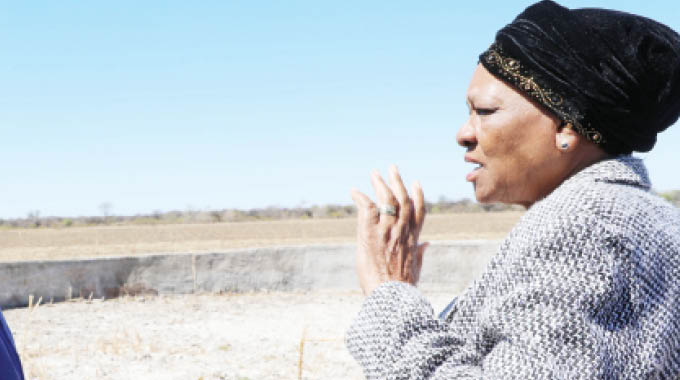
Leonard Ncube in Lupane
GOVERNMENT is considering restructuring its irrigation schemes model after noticing that a majority of them are not viable owing to lack of diversity and business plan.
This has negatively affected the country’s efforts towards ensuring food security and nutrition.
Minister of State in Vice President Constantino Chiwenga’s Office, Evelyn Ndlovu, said this after completing a tour of irrigation schemes in Matabeleland provinces. She noted that the state of irrigation schemes, especially small scale ones, was not pleasing.
The Minister also expressed concern over erratic power supplies and poor reaction by Zesa, lack of marketing strategies, lack of capacity, lack of diversity where small schemes limit themselves to one line of crops, lack of business management plan, slow uptake of new technologies, failure to value add and embrace skills transfer programmes, and an unreliable tendering system.
“Our schemes are allocated little money and I think we need to change that. It’s good I came here because small scale irrigation is not viable at the moment. We can’t continue doing one line of crop, we need viability in each scheme and for that to happen we need to diversify into a variety of crops and livestock in one year,” said Minister Ndlovu.
She called for a new approach to irrigation if the country is to return to its former status as the breadbasket of Southern Africa. Minister Ndlovu, who is also Bulilima-Mangwe proportional representation legislator, visited Phaphamani and Carlsvale Irrigation Schemes in Umguza District last Thursday before touring Tshongogwe and Arda Jotsholo in Lupane District on Friday.
He sentiments were echoed by acting Lupane district co-ordinator, Mr Zachariah Jusa, who said that most irrigation schemes in his district were producing for home consumption.
Minister Ndlovu said that focus must be changed.
“There is lack of diversity and business management strategy in these small schemes. So, we are saying there is a need for a relook at irrigation schemes. We need a plan that is viable where one cannot be in the communal land and at the same time be involved in irrigation because such people are not productive. We have to come up with new systems to address this,” she said.
“We noted that many are producing before they even know who their market is while some are incapacitated in terms of transport and cold rooms hence 70 percent of production is for household consumption, which is a bad model.”
The Minister said to achieve food security the country should have a maintenance plan for all water systems as most boreholes and dams were non-functional. She also called for alternative water sources and irrigation to deal with climate change-induced food deficiency in the country. Minister Ndlovu encouraged value addition and said Government has made a decision to partner with farmers in some of the schemes so as to enhance productivity.
At Arda Jotsholo, Government partnered Mr Brent le Reux whose diversified project has seen the scheme come back to life with close to 300 herd of commercial cattle, 300 pigs, 150 hectares of winter wheat, 20ha of seed maize and 21 different types of vegetables.
The farm is partly supported through Command Agriculture. Mr le Reux commended Government for the programme.
“Without Command Agriculture there is no production. Government is playing a critical role and what we will be planting this year will be supported by the programme,” he said after the tour.
Meanwhile, Minister Ndlovu said her tour, which will see her visiting all the country’s provinces, was meant to influence revival of irrigation schemes and recommend development of new projects to relevant ministries and also make sure there is use of available water.
The Minister intends to cover all provinces before the rainy season.— @ncubeleon
